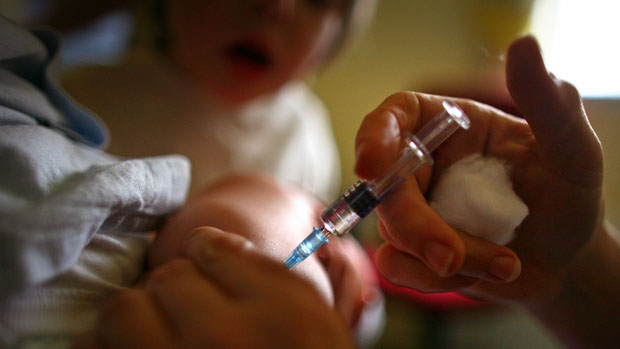Why UK vaccination rates are falling
Take-up rate of all key childhood jabs has dropped for first time on record

A free daily email with the biggest news stories of the day – and the best features from TheWeek.com
You are now subscribed
Your newsletter sign-up was successful
Thousands of children are missing out on routine childhood vaccinations across England, experts are warning.
The latest figures from NHS Digital for England in the year to the end of March 2019 show a marked decline in the uptakes of jabs for 13 different diseases, including whooping cough, diphtheria and meningitis. The number of children having all of the vaccines offered by the NHS has also fallen, for the first time on record.
In 2018-19, 90.3% of children completed their first dose of the measles, mumps, rubella (MMR) vaccine, compared with 91.2% over the previous 12 months. And just 86.4% of children received the second dose of the MMR by their fifth birthday, down from 87.2% year-on-year.
The Week
Escape your echo chamber. Get the facts behind the news, plus analysis from multiple perspectives.

Sign up for The Week's Free Newsletters
From our morning news briefing to a weekly Good News Newsletter, get the best of The Week delivered directly to your inbox.
From our morning news briefing to a weekly Good News Newsletter, get the best of The Week delivered directly to your inbox.
“Although these changes are small proportions, these are big drops in terms of public health,” said Mary Ramsay, head of immunisation at Public Health England (PHE). “The trend is a concerning continuation of what we’ve seen in the last five years.”
Vaccination is the process whereby molecules from or similar to pathogens, either viruses or bacteria, are introduced into the body, usually through an injection, in order to train the immune system to recognise and protect against them.
Vaccines have led to the eradication of the smallpox virus and some types of polio. Other diseases have been dramatically brought under control, including mumps, diphtheria, rubella and hepatitis.
Reuters says that eroding confidence in vaccines, which leaves populations vulnerable to disease epidemics, is “driven mainly by misinformation and rumour”.
A free daily email with the biggest news stories of the day – and the best features from TheWeek.com
So why is this happening? The Guardian says confidence in vaccinations “appears to have been dropping at least partly in response to social media misinformation and scare stories”.
The newspaper points to the continuing circulation of the “discredited claims” of Andrew Wakefield, who was banned from practicing medicine in the UK after published a paper in 1998 that linked the MMR jab to autism.
Political trends may also be responsible. A study outlined in the European Journal of Public Health earlier this year found that the growth of anti-vaccination movements directly correlates with the rise of populism across Europe.
However, Jonathan Ball, professor of molecular virology at the University of Nottingham, suspects that many parents have merely forgotten “just how serious these infections can be, and have started to think of them as simply trivial childhood infections”.
He adds: “We all lead busy lives and it might be tempting to put off a trip to the GP for convenience’s sake.”
There is also a regional dimension to the wider global trend. A study published by the Wellcome Trust in June found that richer countries have less trust in vaccinations.
The biomedical research charity reports that a global total of 79% of people still believe vaccines are safe. However, this number drops to just 59% in Western Europe. The most trusting region is South Asia, where 95% expressed confidence in the safety of vaccinations.
-
 Why is Prince William in Saudi Arabia?
Why is Prince William in Saudi Arabia?Today’s Big Question Government requested royal visit to boost trade and ties with Middle East powerhouse, but critics balk at kingdom’s human rights record
-
 Wuthering Heights: ‘wildly fun’ reinvention of the classic novel lacks depth
Wuthering Heights: ‘wildly fun’ reinvention of the classic novel lacks depthTalking Point Emerald Fennell splits the critics with her sizzling spin on Emily Brontë’s gothic tale
-
 Why the Bangladesh election is one to watch
Why the Bangladesh election is one to watchThe Explainer Opposition party has claimed the void left by Sheikh Hasina’s Awami League but Islamist party could yet have a say
-
 Trump HHS slashes advised child vaccinations
Trump HHS slashes advised child vaccinationsSpeed Read In a widely condemned move, the CDC will now recommend that children get vaccinated against 11 communicable diseases, not 17
-
 A fentanyl vaccine may be on the horizon
A fentanyl vaccine may be on the horizonUnder the radar Taking a serious jab at the opioid epidemic
-
 Health: Will Kennedy dismantle U.S. immunization policy?
Health: Will Kennedy dismantle U.S. immunization policy?Feature ‘America’s vaccine playbook is being rewritten by people who don’t believe in them’
-
 How dangerous is the ‘K’ strain super-flu?
How dangerous is the ‘K’ strain super-flu?The Explainer Surge in cases of new variant H3N2 flu in UK and around the world
-
 Vaccine critic quietly named CDC’s No. 2 official
Vaccine critic quietly named CDC’s No. 2 officialSpeed Read Dr. Ralph Abraham joins another prominent vaccine critic, HHS Secretary Robert F. Kennedy Jr.
-
 This flu season could be worse than usual
This flu season could be worse than usualIn the spotlight A new subvariant is infecting several countries
-
 Why are autism rates increasing?
Why are autism rates increasing?The Explainer Medical experts condemn Trump administration’s claim that paracetamol during pregnancy is linked to rising rates of neurodevelopmental disorder in US and UK
-
 RFK Jr. vaccine panel advises restricting MMRV shot
RFK Jr. vaccine panel advises restricting MMRV shotSpeed Read The committee voted to restrict access to a childhood vaccine against chickenpox